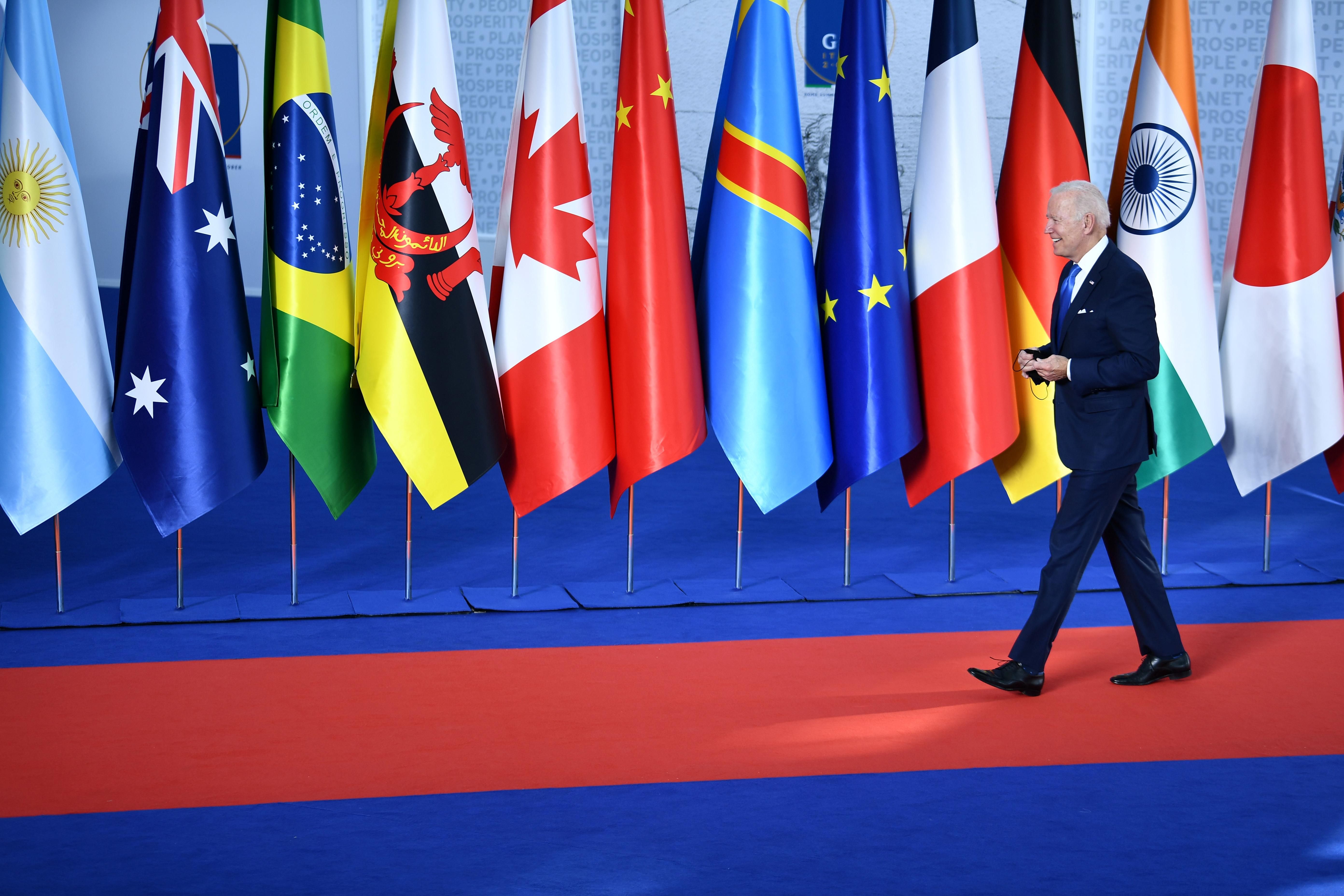Biden's Euro trip. President Joe Biden is on a crucial Euro trip. It began in Rome at the G-20 Summit, where his idea for a global minimum tax rate was broadly endorsed by the group. Biden also visited Pope Francis at the Vatican — a get-together that produced decidedly less scary photos than when his predecessor held a papal visit — and met with France's President Emmanuel Macron to try to smooth over strained relations after the AUKUS debacle, which he now says had been "clumsy." The US president had another face-to-face with Turkey's President Recep Tayyip Erdogan, just a week after Ankara threatened to expel the US ambassador. But there's a domestic component at play too: Biden was hoping to have passed two infrastructure bills, which include money for climate change, before he attended the COP26 meeting in Glasgow, which kicked off on Sunday. Failure to close the deal on Capitol Hill would deal Biden's credibility a heavy blow just at the moment he wants to reinforce the US commitment to climate change reduction goals at this week's summit and to claim, yet again, that America is indeed back! But Democrats continue to wrangle over both what's in the bills and how to pay for them. Meanwhile, only a third of Americans now say that the US is headed in the right direction. Biden was hoping to have the wind at his back as he sailed into Europe. Instead, he is facing a strong political headwind.
Gulf states lash out at Lebanon. Cash-strapped Lebanon is grappling with yet another crisis after Saudi Arabia expelled its ambassador, a move promptly followed by the UAE, Bahrain, and Kuwait in solidarity with Riyadh. The trigger? A Lebanese minister had previously criticized the Saudis' involvement in the ongoing war in Yemen, suggesting that the coalition led by Riyadh was the aggressor in a conflict with the Iran-backed Houthi rebels. Indeed, this latest episode reveals that Lebanon — which has long been plagued by sectarian tensions — yet again finds itself in the crosshairs of the Iran-Saudi rivalry. (Saudi Arabia has cut off aid to Beirut since the-Iran backed Hezbollah movement has gained increasing influence in Lebanese political and social life.) But since billionaire tycoon Najib Mikati was appointed Lebanon's PM in September, the US and France have been lobbying the Saudis to soften their hardline approach to Lebanon, which the Gulf views as an Iranian client state, and reinstate aid to the crisis-ridden country, where three-quarters of the population now live below the poverty line. The latest episode shows that despite speculation of a détente between Tehran and Riyadh, deep animosity persists.
Nicaragua's fake election. At the tail end of this week Nicaragua will hold a presidential "election." We're putting that in quotation marks because President Daniel Ortega, who has ruled the Central American country with a tight fist since 2011, has eliminated any serious (and even unserious) competition. He controls the electoral authorities, and since June, his goons have arrested at least a dozen prominent opposition figures. But things haven't been smooth sailing for Ortega, who led the left-wing Sandinistas during Nicaragua's bloody civil war in the 1980s and has since reinvented himself as a business-friendly devout Catholic. Back in 2018 a botched social security reform prompted protests that quickly spiraled into a challenge to his authoritarian rule. Although he crushed the uprising with brute force, rumblings of discontent continue. What's more, the US and other partners in the region are already readying a new round of sanctions in response to what will certainly be a sham vote on Sunday.
ANC feels heat as South Africa votes. South Africans go to the polls on Monday to vote in local elections, which are viewed as the biggest test for the ruling ANC party since the end of apartheid. The ANC, which has won every nationwide election since 1994, could lose control of major cities, including Johannesburg, to the opposition Democratic Alliance and coalitions of small independent parties because many South Africans are fed up with government corruption and dysfunction. Indeed, ongoing power outages are being blamed on a state-owned power utility long suspected of graft, and crumbling infrastructure on years of financial mismanagement by successive ANC-led governments. President Cyril Ramaphosa, an ANC stalwart, has admitted (some) party mistakes, and required all ANC candidates to sign a non-enforceable pledge to improve public services. More broadly, it's also the first time the ANC will face voters since the deadly riots that followed former president Jacob Zuma's conviction for contempt of court last July. Zuma is now on parole while he faces trial for corruption, but he remains immensely popular with the ANC's left wing — and a thorn in the side of his successor Ramaphosa.
A nail-biter in Virginia. The campaign for the 2022 US midterm elections officially kicks off Tuesday, when Virginia votes to elect a new governor in a race widely seen as a temperature check on Joe Biden's popularity after 10 months. Democrats hope that former Gov. Terry McAuliffe wins back his old job so that the purple state does not slide into Republican hands ahead of presidential elections in 2024. But GOP challenger Glenn Youngkin, a millionaire businessman supported by Donald Trump, has caught up in the polls once led comfortably by McAuliffe in a campaign marked by education culture wars. Now both are in a dead heat, and the result will likely be very close. A Youngkin victory would be a big boost for Republicans, who'll gain momentum going into the midterms next year, where the Dems face long odds of keeping control of both houses of Congress. What's more, it would add pressure on Biden to mediate between the moderate and progressive wings of his party to pass a social spending bill, the hallmark of his policy agenda. With his own approval rate plummeting, the president needs a big win that Democrats can sell to voters a year from now.
